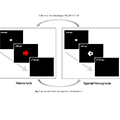Abstract
The congruency sequence effect, one of the indices of cognitive control, refers to a smaller congruency effect after an incongruent than congruent trial. Although the effect has been found across a variety of conflict tasks, there is not yet agreement on the underlying mechanism. The present study investigated the mechanism underlying cognitive control by using a cross-task paradigm. In Experiments 1, 2, and 3, participants performed a modified Simon task and a spatial Stroop task alternately in a trial-by-trial manner. The task-irrelevant dimension of the two tasks was perceptually and conceptually identical in Experiment 1, whereas it was perceptually different but conceptually identical in Experiment 2. The response sets for both tasks were different in Experiment 3. In Experiment 4, participants performed two Simon tasks with different task-relevant dimensions. In all experiments in which the task-irrelevant dimension and response mode were shared, significant congruency sequence effects were found between the two different congruencies, indicating that Simon-type conflicts were resolved by a control mechanism, which is specific to an abstract task-irrelevant stimulus spatial dimension.
